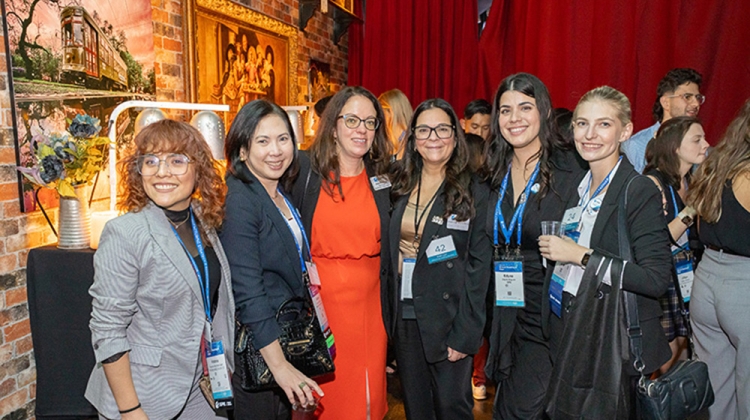At the 2023 ISPE Annual Meeting & Expo, Miguez had the opportunity to meet numerous students and emerging leaders. Many were able to join thanks to the 2023 ISPE Student and Recent Graduate Grant, which funds the attendance of students and recent graduates to one of ISPE’s major conferences. All the students and emerging leaders were hoping to change the industry, make their mark on the world, and improve healthcare for all. Many of the young, passionate, brilliant women Miguez met asked how they could get more involved with Women in Pharma and leverage its community to advocate for themselves as well as other marginalized groups.
On the week of the conference, ISPE hosted its annual Women in Pharma committee meeting, where individuals gathered with those driving the Women in Pharma mission and vision on the local level. They came together in person to brainstorm how to make a difference. Among these individuals, Miguez had the pleasure of meeting Vincent H. Nguyen.
Nguyen came in eagerly wanting to participate in the committee meeting. He explained that he was a graduate of the University of Massachusetts Dartmouth, MA, USA, where he had studied biomedical engineering. At the time, he was in the process of pursuing his master’s degree in biomedical engineering at the University of Texas at San Antonio, TX, USA. Throughout his academic career, he had met many impressive women, many of whom were his peers, and he wanted to do his part to help create more opportunities for them to make an impact. Though he knew he wanted to be an ally, he wasn’t sure where to start and so he figured Women in Pharma might be the right place to begin this journey. Vinny was an active participant throughout the committee meeting, providing fresh insight and a generational perspective that blew the committee away.
The pharmaceutical industry, traditionally a male-dominated sphere, is experiencing a significant paradigm shift. During Nguyen’s tenure at the University of Massachusetts Dartmouth (UMassD) he felt as if they epitomized this transition, with an increasing number of women not only joining but often surpassing the representation of their male counterparts in pharmaceutical studies.
Jill Wilson and Mariana Hebert: Pioneers of Women in Pharma
The journeys of Jill Wilson and Mariana Hebert at UMassD are quintessential examples of the evolving landscape in pharmaceutical sciences. Wilson’s engagement with ISPE and her pioneering work in developing microsponge drug delivery systems mark a significant advance in pharmaceutical technology. She reflects, "Being part of ISPE has not only broadened my professional network but has also deepened my understanding of the impact we can make in drug delivery technologies." Hebert's academic journey, marked by excellence in Bioengineering with a focus on Biomedical Engineering and Pre-Health Studies, showcases the rising influence and prowess of women in this sector. Hebert shares, "My journey (in the university setting), especially my involvement in the Society of Women Engineers, has been about more than just academic success; it's about empowering a new generation of women in pharma."
Rising Female Representation
The increasing number of female graduates in pharmaceutical studies at UMassD signals a broader transformation in the industry's dynamics and perspectives. Women like Wilson and Hebert are introducing diverse approaches to research, leadership, and patient care. Their involvement is critical for developing more comprehensive and inclusive healthcare solutions that address a wider array of patient needs.
Valuing Diverse Perspectives and Leadership
The unique insights and methodologies that women bring to pharmaceutical research are invaluable. With more women taking on leadership roles, the industry is experiencing a diversification in leadership styles, which is key to fostering more collaborative and inclusive work environments. This trend is vital for developing patient-centric care solutions that consider various patient experiences.
Encouraging Gender Diversity
Educational institutions can play a pivotal role in this transformative era. Universities like UMassD don’t just encourage female participation in pharmaceutical studies; they provide substantial support for their overall development. This nurturing environment equips the next generation of women leaders in pharma with the skills and confidence they need to excel.
Overcoming Challenges and Embracing Opportunities
Despite the encouraging trends, challenges such as gender bias and unequal advancement opportunities persist in the pharmaceutical industry. Addressing these issues requires robust mentorship programs and support networks, like ISPE Women in Pharma and local ISPE chapters. Additionally, there is a need for policy changes that promote gender equality. Educational institutions have the opportunity to be at the forefront of implementing such policies and practices, ensuring equal opportunities for all.
Envisioning an Inclusive Future in Pharma
As the pharmaceutical industry approaches an important crossroads, embracing changing demographics and fostering an inclusive environment are essential for driving innovation and strengthening the industry. The progress in university settings, as highlighted by the accomplishments of Wilson and Hebert, point toward a future where diversity and inclusivity are integral to the industry's ethos.
The evolving landscape of the pharmaceutical industry, as reflected in the increasing number of female graduates and professionals offers a glimpse into a future rich in diversity and inclusivity. The stories of Wilson and Hebert are not just individual successes; they represent a broader narrative of empowerment and transformation within the pharma sector. As the industry continues to evolve, addressing existing challenges and seizing new opportunities is crucial. This approach will pave the way for a more dynamic, innovative, and patient-centric pharmaceutical industry, setting new standards for the field.
Women in Pharma® Upcoming Events






